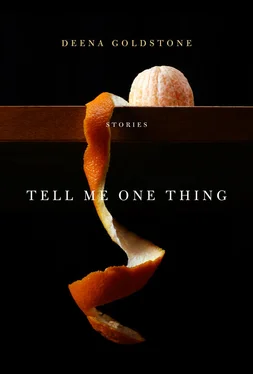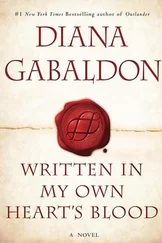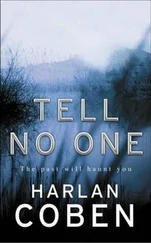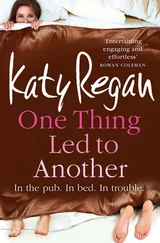“More like being reborn.”
“Oh my God, Ellen, you haven’t been hijacked by some fundamentalist Christian—”
And she bursts into a cascade of laughter. And he smiles at himself. “Well, you said ‘reborn.’ ”
“We’re outside, I can smoke, right?”
“If you have to.”
“This is a long story,” she says as she lights a cigarette, preparing herself for the saga she’s about to tell. “Okay, here goes.… I went to Spain to get away from Buffalo. Well, really to get away from myself in Buffalo. And Dad, he seemed to be everywhere, you know?”
Jamie nods. He left for the same reason.
“It was my fault. I couldn’t leave it alone. I had to tell him about every new job I got, even though I knew — Jamie, I knew— that he’d tell me what was wrong with it and how I was an idiot to work there. And there’d come a time with each new guy I was seeing when I’d say, ‘Come home and meet my mom and dad.’ ”
“A suicide mission,” Jamie says with quiet assurance. None of this is new to him. “Dad didn’t like any of them, and Mom probably said, ‘He seems nice enough.’ ”
Ellen nods. “The phone would ring later that night and Dad would be sure to tell me what a loser I’d picked. And I’d defend the guy, even though I was having my own doubts by the time I took him home. And we’d start shouting at each other and I’d tell him if he ever wanted to see me again, he’d have to clean up his act and he’d shout at me that there was nothing wrong with his act and it was my act that was a pitiful mess.…” Ellen shrugs. “And he was right.”
“Dad was never right,” Jamie says.
“You know,” Ellen tells him, “you have to acknowledge truth wherever it comes from.”
“I don’t think so.”
And instead of getting angry, Ellen laughs again. “Jamie,” she says, “you don’t see the value of the truth?”
“Mostly, no.”
“Uh-oh,” Ellen says, “this is going to be harder than I thought.”
“What is?”
“Saving your life. I’m here to save your life.”
“The impossible dream.” But he’s grinning. “You want another coffee?”
He gets up, goes inside to get it, and she takes a deep breath. The mission is out on the table. He doesn’t seem offended or even reflexively resistant. She can slow down a bit, she thinks. They have time, and suddenly she’s exhausted. She lays her head on her crossed arms and feels the warmth of the metal table beneath them. By the time Jamie comes back with their new coffees, she’s asleep.
SHE LEANS INTO HIM as they walk home. He has his arm around her and is laughing as she trips over her own feet. Anyone watching would think they were a couple stumbling home after a very drunken all-nighter.
When they get back to the condo, Jamie opens the pullout couch in his second bedroom, the one he has made into his office, and tucks Ellen in. She’s mumbling “Thank you,” barely awake, and then she’s not. He takes his fifth period’s essays from his desk and closes the door softly behind him.
The day is glorious, quintessential San Diego weather — assertive blue sky, a comforting breeze from the ocean, temperature just right for sitting in the sun. He’ll take the papers and another cup of coffee and read them on his patio—“microscopic” as it may be — while he waits for Ellen to wake up.
He assigned his eighth graders The Miracle Worker . This is his honors class, and he’s hoping at least some of them will be able to think beyond the “triumph over adversity” reaction most people have when they read the play or see the movie. That treat, screening the movie, Jamie always saves for last. He wants them to come to the play without the overlay of Anne Bancroft and Patty Duke.
For Jamie, Annie Sullivan is the more interesting character, more nuanced, and yes, ultimately the more “heroic.” Her own childhood was horrendous — institutionalized in a mental hospital because there was nowhere else to put her. Blind before an operation restored some measure of her sight. Literally falling at the feet of “important men” who came to visit the asylum and pleading for an education. And then, without any real training, coming to the Keller household as a young woman barely out of her teens and refusing to give up on the wild animal she found there — Helen. There’s a reason the play is titled The Miracle Worker and not Helen Keller . He hopes at least some of his students will see that. He doesn’t expect any of them, except maybe Colleen McAllister, who is serious beyond her thirteen years, to understand that Annie Sullivan is also heroic because she allows herself to love Helen fiercely. After all that life had thrown at her, she still opens her heart. That’s a kind of heroism Jamie doesn’t expect middle schoolers to begin to understand. That’s the kind of heroism he most admires.
He picks up the first essay. It’s Chloe’s, outgoing, gregarious Chloe, who always greets him with “How’s it going, Mr. O’Connor?” and never seems to have a bad day. “Helen Keller was an amazing person who overcame all the challenges life threw at her” is her topic sentence. They’ve been working on creating good topic sentences. This one doesn’t bode well for an essay he’d want to read. Jamie puts the paper aside and tries the next one. “When Helen Keller met Annie Sullivan, it changed her life.” This one is from Kim-Ly, granddaughter of Vietnamese immigrants, who wears the shortest skirts in the class. Beside the ambiguous “it” that Jamie circles with a red pen, the sentence doesn’t promise any new thinking, either. He tries the third essay. “Being deaf, dumb, and blind didn’t stop Helen Keller from having a full life.” This one is from Sam, a too-earnest kid who always seems to Jamie as if he’s half Labrador puppy. Jamie circles the word “dumb” and writes, “Helen Keller was anything but ‘dumb.’ ”
Jamie puts the essays aside and gets up. It’s moments like this, when he suspects that he hasn’t managed to motivate his kids to any creative thinking, that would depress most teachers he knows. But that’s not the effect they have on Jamie. Instead, he asks himself what he could have done differently. How could he have led his students away from conventional thoughts and into creative ones? What should he say when he hands these papers back to them? It’s like a puzzle where he has to find just the right pieces in just the right order to make the picture he wants them to consider appear in their heads.
Jamie loves his chosen profession. He will readily admit that there may be nothing else in his life that isn’t compromised, thwarted, distorted, or unfulfilled, but the knowledge that he has found his true calling keeps him going.
He searches through the stack of essays for Colleen’s and pulls it out. Her topic sentence is “ The Miracle Worker is a play about finding your special gifts in life.” Ah, better! Interesting take. Colleen, you’ve saved me , he thinks as he settles back to read her essay.
By the time the light has mellowed into dusk, Jamie has read more than half of his students’ essays and written them lengthy notes that he suspects very few of them will even read. He’s seen them. They flip to the grade and then quickly stash the paper in their backpack, where it disintegrates in short order and joins the other wads of trash at the bottom of the bag. He gets up and stretches his back. He’s stiff from sitting in one position for so long. Ah, creeping middle age , he thinks, as he often does these days. Once you pass forty, there’s no denying middle age .
He checks in on Ellen, cracks open the door to see her sleeping like she’s in a coma. He smiles in recognition. All the O’Connor siblings sleep that way — through anything, oblivious to noise, a survival technique they all learned early on in a household that was perpetually loud and had no detectable schedule. You were as likely to see a toddler with a full diaper wandering around at midnight as you were to come across one of the boys snoring on the basement floor at twelve noon.
Читать дальше












